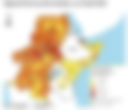- In April 2024, an estimated 74.9 million people in the region were highly food insecure and in urgent need of humanitarian assistance. This included 59.1 million people, as per an IPC analysis of 10 of the 13 countries covered by the FSNWG, in addition to 15.8 million people in Ethiopia, based on the 2024 Humanitarian Response Plan (HRP). Of these, 46.8 million were in seven of the eight IGAD member states.
- If the ongoing conflict in Sudan continues to escalate, further impeding households’ access to the already scarce food and income sources, parts of West Darfur, Khartoum, and areas of Greater Darfur with high concentrations of displaced persons such as El Fasher in North Darfur may meet the criteria for Famine (IPC Phase 5).
- Heavy rains from late March through April have led to severe flooding, especially in Kenya, Somalia, Burundi, and Tanzania, causing loss of lives and livestock, displacing hundreds of thousands of people, and destroying farmlands and critical infrastructure such as roads, bridges, and dams. Despite increased agricultural performance in some parts of the region as a result of the enhanced rains, increased levels of acute food insecurity are probable in the severely affected areas.
- The nutrition situation across the region remained concerning, largely driven by conflict, displacement, food insecurity, infectious diseases, and poor water, hygiene, and sanitation (WASH) conditions. Extensive flooding observed in parts of the region poses a risk of increased malnutrition levels in the affected areas.
- Maize and sorghum prices in most markets across the region, including in Kenya, Somalia, South Sudan, Uganda, Burundi, Rwanda, and Tanzania, followed seasonal trends in the first quarter of 2024, as increased supply from previous above-average harvests kept them below last year’s and near average levels.
- The region has seen a rise in disease outbreaks, including cholera, malaria, measles, dengue, yellow fever, and polio, as wetter-than-normal conditions observed over most parts of the region heightened the risk of water-borne and vector-borne diseases, particularly in the areas affected by flooding.
Tags:
#Foodsecurity
,
#FSNWG




